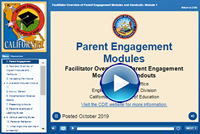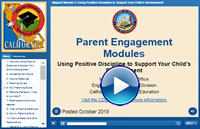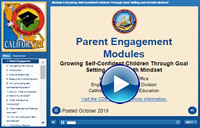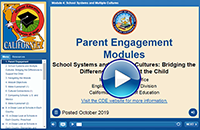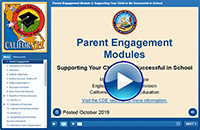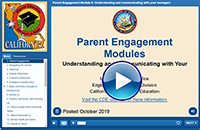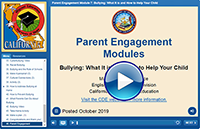Latest News and Comment from Education
-
MORNING NEWS UPDATE: JANUARY 27, 2026 - *MORNING NEWS UPDATE: JANUARY 27, 2026* U.S. News 1. Border Patrol/ICE Chief Bovino to leave Minneapolis post — Following fatal shootings by ...1 minute ago
-
Paper: AI Destroys Institutions - From its title-- "How AI Destroys Institutions"-- this draft essay pulls no punches. It's heavily researched (166 footnotes) and plain in its language. I...19 minutes ago
-
“This is a massive overreach of power by the Trump administration. Due process isn’t optional. It’s a fundamental right.” - The rogue Department of Homeland Security, declaring itself to be above mere constitutional restraints, has now murdered two Americans without provocati...42 minutes ago
-
Congress Looks to Pass Education Budget that Rejects Trump’s Proposed Funding Cuts. Will It Pass by Friday? - We began federal Fiscal Year 2026 on the first of October, 2025, but so far the federal government has been operating without a formal budget agreement. Y...1 hour ago
-
For AI to Truly Work in the Classroom, Schools Must Give Their Teachers a Say (Eve Colavito & Adam Feiler-Ware) - This article appeared in The 74 on January 21, 2026 Jomeilin Reyes, a seventh-grader English learner, had spent most of the fall putting his head down duri...6 hours ago
-
Oklahoma legislators seek deal on sports betting while weighing pros, cons - [image: Oklahoma sports betting]As a lawmaker in a state where sports betting remains illegal, Oklahoma Sen. Bill Coleman wondered what all the fuss was ...8 hours ago
-
Education News Roundup, January 26, 2026 - From a reader: *There has been some personnel movement heralded in the past week - Eckstein Middle school principal is headed to take over at Roosevelt t...12 hours ago
-
-
The Contribution of College Majors to Gender and Racial Earnings Differences - Gender and racial/ethnic gaps in labor market earnings remain large, even among college-goers. Cross-gender and race/ethnic differences in choice of and...18 hours ago
-
The Smart Phone Will Be ICE’s Undoing. - The ubiquity of smart phones can pose a real hassle to societal functioning. Many businesses now post signs instructing customers to please refrain from th...21 hours ago
-
Curmudgucation: Are Education Savings Accounts Actually Vouchers? - Curmudgucation: Are Education Savings Accounts Actually Vouchers? Short answer: Yes. Long answer to follow. An Education Savings Account (ESA) may turn u...21 hours ago
-
Crisis Exposes Cowards in Charge - When humans face crisis, leadership is revealed. Not in speeches or slogans, but in patterns of behavior that repeat across time, sectors, and political sy...21 hours ago
-
ICE Ignores Constitutionp - The Department of Homeland Security decided that ICE agents were exempt from the Fourth Amendment, which prevents police from entering homes without a warr...22 hours ago
-
-
Absolute MUST WATCH from David Jolly - the former Republican Congressman who is running for the Democratic nomination for Governor of Florida. The embedded video is just under 8 minutes. Rick...23 hours ago
-
Play-Based Learning Cannot Be Measured . . . And That's a Good Thing - Critics of play-based learning often express doubts about whether any "meaningful" learning happens through play. Or rather, they don't count it as lear...1 day ago
-
65: "So now we are getting drunk/ What was sinking now is sunk" - "And when you wake up on your eleventh birthday you expect to feel eleven, but you don’t." Eleven, Sandra Cisneros1 day ago
-
Under the Tree #146 - Episode #146: A New Constitution for Public Education with Jay Gillen and Jamarria Hall1 day ago
-
This is un-American Liam Conejo Ramos - This week in Minnesota, ICE agents took a 5-year-old boy named Liam Conejo Ramos from his driveway after he came home from preschool. Let that s...1 day ago
-
ICYMI: Big Frozen Blizzard Edition (1/25) - We are getting hammered this morning, but my nephew and his wife in Minnesota are expecting negative twenties--cold enough to put the area under an explodi...1 day ago
-
-
At Substack: The Politics of Calling for No Politics: Novel Edition - The Politics of Calling for No Politics: Novel Edition2 days ago
-
Ed Tech Digest - Ten years ago, in another somewhat futile attempt to reduce the backlog of resources I want to share, I began this occasional “Ed Tech Digest” post where...2 days ago
-
It Is Unconscionable That Our Government Is Choosing to Harm Children Like Liam - Our immigration enforcement is inflicting injury, trauma, and fear on children across the entire country2 days ago
-
Murder inc. - Another murder by ICE today! I watched the video and 7 ICE thugs had him on the ground, one was punching him in the face as he was down then they shot him ...2 days ago
-
ICE Executes Another Citizen in Minneapolis - WARNING VIOLENT VIDEO: Federal Agents just shot and killed another person in Minneapolis. Before the ICE/Homeland Security/White House LIES start tumblin...2 days ago
-
-
ICE: Not your friendly neighborhood cops - I was talking with an acquaintance, and made a comment about ICE being reported in Leelanau County. Don’t you want to see illegal immigrants gone? she aske...2 days ago
-
Well done Minnesota. A General Strike is a General Strike. - The last time there was a general strike in Minneapolis was 1934.2 days ago
-
The Timing Tells You Everything - “Belief has nothing to do with truth.” ― Percival Everett, James The Timing Tells You Everything On optics, vendors, and the quiet rules that govern Metr...3 days ago
-
Dear Ohio Anti-Property Tax Campaign, the State of Ohio should NOT pay for education alone - The Ohio Supreme Court called for a reduction in schools' overreliance on property tax, not those taxes' elimination.3 days ago
-
Craig Garrett on the need for human-centered schools rather than learning based upon AI. - * Craig Garrett is a parent leader in District 14 whose group, District 14 Families for Human Learning, has just created a new website here. You can sig...3 days ago
-
AI Is Not Ruining Schools. It’s Just Doing What Schools Asked. - “The risks of AI in schools outweigh the benefits, report says” is the title of a recent NPR story. The title is dramatic, reassuring, and deeply misleadin...3 days ago
-
Meeting the Moment: Protecting Kids, Making Sense of Chaotic Times - What schools can do when the government makes students and families feel unsafe3 days ago
-
Donald Trump and the Triumph of Narcissism - Although I am neither an historian nor a psychologist, I know enough American history to know that Trump’s demand that Greenland capitulate to his desire...4 days ago
-
Resolution calling for a moratorium on AI in NYC public schools until rigorous guidelines are enacted to prevent harm to students - This reso as an editable word doc is here. Draft resolution calling for a moratorium on use of AI in NYC public schools until rigorous guidelines can be en...4 days ago
-
Bellwether and K12 Coalition Published Misleading Report - By Thomas Ultican 1/21/2026 Bellwether’s report is called “How We Solve America’s Math Crisis: A Systemwide Approach to Evidence-Based Math Learning.” The ...5 days ago
-
-
-
McMahon’s Troubling School Patriotism Fails to Address The Needs of Children - I have a dream that one day this nation will rise up and live out the true meaning of its creed: We hold these truths to be self-evident, that all men ar...1 week ago
-
Summer Food Service Program (SFSP) Sponsor - 2026 - Summer Food Service Program Sponsors Survey for summer 2026.1 week ago
-
“As Through a Glass, Darkly” - “Through a glass, darkly” is a powerful poetic image that has always resonated with me. It conveys the truth that, although we humans convince ourselves th...1 week ago
-
Deception: How the 100,000 Studies Lie and the “Five Pillars” Lie are Jeopardizing the Future of Children in America - There is credible evidence that two deceptions have been perpetrated on the American people, and that these inseparable deceptions have been codified in fe...1 week ago
-
Charter School Closes Leaving Families Without a School - Legends Charter Academy had been in trouble for years–but did not tell parents. Why were they running such huge deficits in a state that generously funds...2 weeks ago
-
Hello world! - Welcome to WordPress. This is your first post. Edit or delete it, then start writing!2 weeks ago
-
The Schools Are Failing (Again) - What’s behind the latest round of public education panic?2 weeks ago
-
2025: Because We Had To Do Something About It - Editor’s Note: Thanks again for being part of my community, particularly to those who are paid subscribers. Your sponsorship of this space has allowed me...3 weeks ago
-
2025: Because We Had To Do Something About It - Editor’s Note: Thanks again for being part of my community, particularly to those who are paid subscribers. Your sponsorship of this space has allowed me...3 weeks ago
-
Is The ‘Illustrative Math’ Curriculum Working? - One of the initiatives of former (and disgraced) Mayor Adams and of the former (and disgraced) Chancellor Banks was a math plan called ‘NYC Solves.’ As par...3 weeks ago
-
20 Best Cdpap Programs In Staten Island, NY (2024 Updated) - 20 Best Cdpap Programs In Staten Island, NY 1. Dhcare Licensed Home Care Agency Rating: (5.0 ) Located in: Kingston Place Medical... The post 20 Best ...3 weeks ago
-
Is College Harder Than High School? A Comprehensive Guide - Transitioning from high school to college is a significant milestone in every student’s life, and it often...3 weeks ago
-
In 2025, They Tried to Ban the Truth—We Taught It Louder - My new Truthout essay demonstrates how more educators came to understand that education has never been neutral — it either liberates or subjugates. And man...3 weeks ago
-
Shutting Down The Site - Ten years ago, I ran for a seat on the LAUSD School Board of Education with the goal to *Change the LAUSD*. I am proud of the campaign we ran. We achieve...3 weeks ago
-
A colleague looks back at 2025 - Forwarded this email? Subscribe here for more I get knocked down But I get up again BETSY WOLF DEC 31READ IN APP I’ve been quiet for most of 2025. Much of ...3 weeks ago
-
Short term plan to Un-Florida Florida’s Public Schools - A Two-Year Plan for Reforming Florida Public Education Finance & Governance In a recent report on public education in Florida, I made the following recomme...4 weeks ago
-
Much Ado About Something - What the State Won’t Tell You About the Schools of Hope Co-Location Scheme A brief note:Accountabaloney is heading off...4 weeks ago
-
-
December’s Parent Engagement Resources - Check out the latest issue of the The School Community Journal. I was an athletic trainer in the NFL and MLS. Three things I wish every parent knew is from...5 weeks ago
-
Missing digits puzzle - Can you find the missing digits? Could I have offered fewer digits (and still have one solution?) could I spread the digits better? _ _ x _ _ ________ 496 ...1 month ago
-
-
-
The Company You Keep - Even though the filing period for the 2026 elections isn't until April, let's all pay close attention. The candidates lining up to run will tell you more a...1 month ago
-
It Is Up to Us to Defend Democracy - Do we have the courage to defeat an authoritarian regime? I believe we do, if we organize strategically and effectively. There is no time to waste. Do we...2 months ago
-
-
This Is What Democracy Looks Like - The polls for Prop 50, CA’s ballot initiative that counters MAGA’s illegal gerry-mandering in Texas, opened Tuesday, November 4, 2025,… The post This Is ...2 months ago
-
A SNAP Decision: Eat the Rich - Don’t feign surprise when the famished plan their own feast.2 months ago
-
Dear NJ Teachers and Their Families: You MUST Not Vote For Jack Ciattarelli - To all NJ public school staff and their families: *You must not vote for Jack Ciattarelli. He will do serious, lasting damage to you personally, and the ...2 months ago
-
John Kowalko Passed Away. The Champion Of Opt-Out. A Delaware Hero. - Former Delaware State Representative John Kowalko died yesterday, He was 80 years old. He was my friend and he was the most Progressive legislator I have e...3 months ago
-
Keep ICE’s Big Tech partners out of our kids’ counseling services! - Mental health is a prerequisite for learning, and all kids deserve access to mental healthcare. As the Trump administration ramps up its mass deportation c...3 months ago
-
Blogoversary #19 — Time to Move on - Times have changed. I had a nice long run here, but let’s face it, it ended a while ago. So I’ve moved. I’m not writing much any more, but when I do it wil...4 months ago
-
What Will Todd Blanche Discuss with Ghislaine Maxwell? One Guess. - Todd Blanche was Donald Trump's personal lawyer in his criminal trial in New York City.6 months ago
-
McGrath and Kaminsky: Key Names in the School Policy Debate - The landscape of American school policy is no longer shaped only behind closed doors. It’s debated in town halls, on social media, and through public prote...7 months ago
-
"Didn't do *that*," part 1: new Schofield case developments reveal crucial 10th Circuit/Ledger lie - The record is clear. Jeremy Scott confessed at least 40 times in a 2017 hearing. He never recanted. The Ledger must retract its lie to force Judge Kevin Ab...8 months ago
-
Achieve 3000 Answers Key (Updated 2023) - Are you on the hunt for the most recent Achieve 3000 answers for the year 2023? Your search is over! ... Read more8 months ago
-
Il Papa è Morto - Francis brought a distinct pastoral outlook to his papacy. A simple man, he lived in a small apartment in the guesthouse. He sought to make the church acce...9 months ago
-
Kemenangan Member Birutoto Main PG Soft Speed Winner - Kemenangan Member Birutoto Main PG Soft Speed Winner Birutoto – Situs Slot Gacor Terpercaya The post Kemenangan Member Birutoto Main PG Soft Speed Winner...9 months ago
-
Mike Shulman the ARISE UFT Judenrat - I was surprised to learn that Mike Shulman has aligned himself with ARISE. I previously supported him, advocating that the Castle Doctrine could have bee...9 months ago
-
How Do We Fight Trump? - Dear Friends, I don’t know when and why it hit me. But I suddenly realized how serious Trump is about changing the country into something that horrifies. I...9 months ago
-
Can Students Expect a Relevant Education to be Delivered by Irrelevant Educators? - As a veteran teacher of forty years in the classroom, let me be clear, teachers are not completely at fault for becoming irrelevant in their profession. It...10 months ago
-
The US Department of Education Should not be Eliminated. Still, it must be reformed. - If you don’t have an attention span that lasts long enough to learn what I’m teaching in this post, start with the conclusion first. Then if you want to re...11 months ago
-
Malcolm & John David Washington Talk NFL, Christopher Nolan & ‘The Piano Lesson’ - 'The Washington brothers built their careers apart—until an irresistible project drew them together. In The *Piano Lesson*, they tackle a father’s thorny...1 year ago
-
AIN’T IT AWFUL - As the terrible feelings of dread and angst spread across the world the great majority of the American people feel powerless before the onslaught of those ...1 year ago
-
Did Darryl Willie lie or interfere in the whistleblower investgation? Why not both? - Willie said below to Action News Jax [image: image.png] It's troubling for quite a few reasons. First he is saying the board knew about the complaint an...1 year ago
-
Could This Be Gadfly’s End? Top 12 Articles From 2023 Read By Fewer Than Ever - After 9 years of pounding my head against the wall - well, it seems like the wall is winning.2 years ago
-
Redesigning School Governance: Beyond Mayoral Control - From time to time the legislature passes a bill with a sunset provision, unless the law is reauthorized by a specific date the law reverts to the law it re...2 years ago
-
POSTPONED: Florida’s Impact on Social Studies - POSTPONED: discussion with Florida and DC educators and advocates on the impact of Florida's new laws Continue reading2 years ago
-
Vote NO on the UFT Contract. Here is Why: - The best reason to vote no on this contract is this: UFT Unity* lied* to us in 2018. They misrepresented that contract. It was predicated on deals we wer...2 years ago
-
-
-
Testimony to the CPS Truancy Task Force - I prepared testimony for one of two public hearings held by the Chicago Public Schools Truancy Task Force, a body mandated by state legislation. The meetin...3 years ago
-
Tennis Memories from a Time When Racism and Anti-Semitism Still Prevailed - I learned tennis at a public park in Brooklyn- Lincoln Terrace- where the teaching pro was a mailman named Phil Rubell. Almost all the kids who took lesson...3 years ago
-
There Is A Teacher Shortage.Not. - THERE IS A TEACHER SHORTAGE. And just to be sure you understand, it’s not that teachers don’t want to teach. It’s not that there aren’t enough teachers cer...3 years ago
-
-
Want to know the condition of a Philly school building? New map to help. - [image: Two students walk by a Philadelphia school building.] Aging infrastructure has been an issue for Philadelphia schools for years. A new interactive...3 years ago
-
STREET LIFE - My mom told me, “You should treat all people equally, but don’t bring a “colored” into the house.” I believed … Continue reading →3 years ago
-
Schools Matter: Reflecting on Green Dot’s Disastrous Locke Takeover - *“Green Dot came and made it into more of a jail.” — Chris* My history of opposing the Green Dot Charter School Corporation back when I was an activist i...3 years ago
-
Book Banning Turns to Dick and Jane - Breaking News: Dateline February 4, 2022 - Parents in Dimwitty, Alabama have asked the Dimwitty Board of Education to ban the children's primer *Fun with...3 years ago
-
Have You Heard Has a New Website - TweetHave You Heard has a new website. Visit us at www.haveyouheardpodcast.com to find our latest episodes and our entire archive. And be sure to check out...4 years ago
-
Follow me at Substack - I've moved. Follow me at Substack I'm now posting regularly at Substack. You can subscribe for free to my new Edu/Pol blog at michaelklonsky.substack.com ...4 years ago
-
I’ve moved. - I’m on Substack now. You can continue to receive periodic posts for free. Or you can read every post and comment for $5 a month, $60 a year. fredklonsky.su...4 years ago
-
Milwaukee Bradley Foundation at Center of Attacks on U.S. Voting Rights - The Big Money Behind the Big Lie Donald Trump’s attacks on democracy are being promoted by rich and powerful conservative groups that are determined to win...4 years ago
-
Milwaukee Bradley Foundation at Center of Attacks on U.S. Voting Rights - The Big Money Behind the Big Lie Donald Trump’s attacks on democracy are being promoted by rich and powerful conservative groups that are determined to win...4 years ago
-
Aspiring Teachers Get New Help Paying For College - [image: colorful classroom pattern] *; Credit: shuoshu/Getty Images* Cory Turner | NPR New rules kick in today that will help aspiring teachers pay for c...4 years ago
-
Major victory over a corporate charter school chain and their trade association - Original post at Robert’s page on Medium. On Tuesday, March 23, 2021, I got my second big win in court against a charter school corporation. It was also a ...4 years ago
-
Tips Akses Situs Judi Qq Tanpa Perlu Takut Nawala - Kegiatan berjudi slot melalui situs judi qq online, sekarang sudah dilakukan oleh banyak penjudi Indonesia. Tentu, Kamu yang sedang membaca artikel ini a...4 years ago
-
The Threat of Integration - I have lived in the same house in the Miracle Mile section of Los Angeles for over 30 years, where up until now I have had little or no interaction with th...5 years ago
-
New Teacher Evaluation Report Released by the Network for Public Education - A new report on current teacher evaluation systems throughout the US was just released by the Network for Public Education. The report is titled, “Teachers...5 years ago
-
www.job-applications.com - https://www.job-applications.com/bed-bath-and-beyond-job-application/5 years ago
-
Teacher Creates National Database Tracking COVID-19 Outbreaks in Schools - Kansas educator Alisha Morris's online coronavirus news-tracker goes viral, now hosted on a new NEA website.5 years ago
-
Correction for July 10th Post on School District Audit - On July 10, 2020 we published a post “School District Caught Manipulating Attendance Records to Get More Money” which incorrectly cited Valley Park School ...5 years ago
-
We fight for a democracy worthy of us all! - The nation stands at a crossroads, said NEA President Lily Eskelsen García in her final keynote address to the 2020 NEA Representative Assembly and it’s up...5 years ago
-
Giving Private Schools Federal Emergency Funds Slated for Low-income Students Will Shortchange At-risk Kids - Low-income Seattle students began to pick up bagged lunches in March after their school closed. Karen Ducey/Getty Images Derek W. Black, University of Sout...5 years ago
-
The Passing Of Chaz 1951-2020 Age 69 - I am the son of Chaz and like to inform you that he passed away this afternoon from the COVID virus. My father passed in peace beside his loved ones. We ar...5 years ago
-
Let The Next Round Of Anti-Semitic Ads Begin - All four pro-public education candidates came in first in their LAUSD school board elections, but two will face run-offs in November.5 years ago
-
The Fight For Our Children - *The number of suicides among people ages 10 to 24 nationally increased by 56 percent between 2007 and 2017, according to a new federal report showing the ...5 years ago
-
Love Grow Your Own (but not without the actual growth part) - The Governor of Virginia, Ralph Northam, recently announced a grow-your-own type of program for teachers. According to this piece: On Monday, Governor Ral...5 years ago
-
Another attempted cash grab by the corporate ed crowd in Washington State: House Bill 2788 - The League of Women Voters has opposed charter schools because they don’t have boards elected by the voters but instead the corporation running the schools...5 years ago
-
Some of Our Graduates Don't Even Know How to Tighten a Nut - Are schools neglecting practical knowledge and skills? Many of our students are graduating from high school with extremely limited practical knowledge essen...6 years ago
-
Read to Self: Just a Kid and a Book. - Date: Monday, January 5, 2020 Place: My classroom Student: Mrs.Mims, could we start doing Read to Self again because I got this great book for Christmas an...6 years ago
-
Reminiscences - I just finished dumping the rest of my lesson plans. I guess I held on to the calculus ones for so long because I spent so much time working on them an...6 years ago
-
Just Asking for some Teachers I know. - Recently Wisconsin Governor Tony Evers stated, We must … recognize that part of supporting our kids in the classroom means supporting the educators who t...6 years ago
-
Charging a terrified 10-year-old girl as a criminal is a very bad look for state attorney Dennis Ward - What the hell is going on? As a parent, I feel very comfortable using this exact wording to ask this … Continue reading →6 years ago
-
Cara Menang Bermain Judi Bola Online - Bermain judi bola online tentu saja memiliki kesenangannya tersendiri baik itu mendapatkan keuntungan maupun ketika menantikan hasil skor pada sebuah perta...6 years ago
-
Blaming Schools for Student Absences is Like Denouncing Doctors for Disease by Steven Singer - Originally posted at: https://gadflyonthewallblog.com/2019/08/25/blaming-schools-for-student-absences-is-like-denouncing-doctors-for-disease/?fbclid=IwAR1LV...6 years ago
-
Jersey journalist roughed up at session sponsored by charter school groups - The sponsors of an event that doesn’t like journalists An independent New Jersey journalist was roughed up, his video camera was seized, and he was ejected...6 years ago
-
K12 Inc. Data Breach Puts thousands of students at risk - It's hard to believe school districts are still contracting with this horrible company. K12 Inc. is the largest for-profit online alternative to actual pub...6 years ago
-
A Critique of Standards-Based Grading - It first happened to me about ten years ago. I was beginning my third year of teaching in a new school in Washington, DC. Social studies teachers were si...6 years ago
-
Reduced time for testing? Not so fast. - NYSED and Commish Elia continue to say that the NYS Assessments are of reasonable length, I completely disagree. Here is what NYSED states are average expe...6 years ago
-
A Response to NorthJersey.com's Explosive "Cashing in on Charter Schools" Series - From NorthJersey.com's Cashing in on Charter Schools series Please note: THIS is what journalism looks like. For the better part of a *DECADE* I have wa...6 years ago
-
-
This Week in Education Organizing - February 15, 2019 - Coalition for Education Justice to Release Report on CRE Eighty-five percent of public school students in New York City are Black, Latinx, or Asian and y...6 years ago
-
The World According to Michelle Rhee - The men behind the curtain fashioning the brave new world of corporate run education in America! Michelle Rhee is the founder of StudentsFirst, The New T...7 years ago
-
Libraries, books and overcoming the effect of poverty - *Published in the New York Times, September 20, 2018* *To the Editor:* *Re “Why libraries still matter.” [https://www.nytimes.com/2018/09/08/opinion/sund...7 years ago
-
TSJ's 17th Annual Curriculum Fair - *TSJ's 17th Annual Curriculum Fair* *** REGISTER HERE *** *From Puerto Rico to Chicago:* *Reclaiming and Reimagining Our Communities* Saturday, November 1...7 years ago
-
Whose Opinions Matter in Education World? - It's hard to identify education heroes and sheroes. And perhaps even harder to pinpoint just whose work is slanted, paid-for and dishonest.7 years ago
-
Book Review: The History of Institutional Racism in U.S. Public Schools (2018, Garn Press) by Susan DuFresne - I recently had the privilege of reading Dufresne’s powerful illustrated history of educational and institutional racism in the United States. Dufresne blen...7 years ago
-
Corruption on Top of Corruption: How Rahm’s Response to Sexual Abuse of Students Reveals His Core Function - Rahm Emanuel’s response to the Chicago Tribune investigation that found CPS failed to protect hundreds of students from sexual abuse is cowardly. It is co...7 years ago
-
New Local Businesses in Sacramento - Starting a new local business in Sacramento is a monumental task, but can be accomplished with footwork, perseverance and knowledge. One must learn the loc...7 years ago
-
Lesson Plan: Rhyme and Rhythm in Poetry - I’ve started a recent unit on poetry with my class. I’m not a poet, and I’m not a poetry fan (I don’t hate it, but I’m a prose gal), so this makes it harde...7 years ago
-
The Apotheosis of Betsy DeVos - Betsy Devos has drawn few headlines in recent months, and that is a good thing for the Secretary of Education. Her tenure began with Vice President Mike P...7 years ago
-
A Teacher’s Tale in the Midst of the Terror in our Schools - Students’ active-shooter plan for teacher in wheelchair: ‘We will carry you’ Reprinted from Allison Slater Tate Feb. 21, 2018 at 4:58 PM Like teachers all ...7 years ago
-
Social Emotional Data. The new Cash Cow in the Corporate Assessment Industry - Recently I was asked to allow my son to participate in a survey at school. The "opt in" survey form specifically stated, "the questions on the survey rela...8 years ago
-
Education Is a Civic Question - In their final post to end Bridging Differences' decade-long run, Deborah Meier and Harry Boyte urge readers to put the energy, talents, wisdom, and hard w...8 years ago
-
Site News: New Home for Education News & Commentary - Quick! Get over there! The daily education news roundup and education commentaries that you're probably looking for are now being published over at The Gra...8 years ago
-
Should We Be Grateful? - In an odd turn of events, and with little explanation, Michigan Governor Rick Snyder has decided to return the state’s School Reform Office back to the Dep...8 years ago
-
Parents Deserve to Know Who Is Being Appointed to State Board of Ed - I spent a rather surreal day at NJ Senate's Judiciary Committee meeting yesterday. This Committee, headed by Democrat Nick Scaturi, is responsible for a...8 years ago
-
An Open Letter to NC Lawmakers - An Open Letter to NC State Lawmakers and NC State Superintendent Mark Johnson: I am a NC native, voter, and public school teacher. I am addressing you all ...8 years ago
-
The Secret to Fixing Schools (My Next Bestseller) - The Secret to Fixing Schools (My next bestseller) Prologue I just finished watching a fascinating documentary on Netflix entitled, “The Secret”. The film p...8 years ago
-
CPS Targets Special Education Teacher Sarah Chambers - Here are the remarks from an action we did today at River Point Plaza, a new development that used over $30 million in TIF funds. CPS claims we are broke...8 years ago
-
Farewell, Sleep - Today is the official last day of my spring break. I've done a scientific survey: My natural bedtime is 2 AM, and my natural wake up time is 9:41 AM. Tom...8 years ago
-
March is nearly over and I didn't do anything for WOMEN'S HISTORY MONTH - I was inspired when I saw this meme I guess it can be called of WOMEN IN STEM and "IT'S OKAY TO BE SMART" And I began thinking about how the only subjec...8 years ago
-
REPORT: States With the Best and Worst Schools - States With the Best (and Worst)Schools By *Evan Comen, Michael B. Sauter, Samuel Stebbins and Thomas C. Frohlich* January 20, 2017- http://247wallst.com ...8 years ago
-
Test Refusal = People Power - In recent months, social media has been ablaze with talk of regular folk taking action to resist the Trump agenda. Protests are a daily occurrence, and ev...8 years ago
-
Attitude Determines Altitude* (*conditions apply)… and the Importance of Humane District Themes - It has been a tumultuous few years in the South Brunswick community, specifically the South Brunswick School District. All you have to do is google the dis...9 years ago
-
What Is To Be Done? Trump, the Election, and the Student Loan Crises - President-elect Donald Trump delivering acceptance speech in New York, NY on November 9 (Photo Credit: Chip Somodevilla/Getty Images Ever since now Presi...9 years ago
-
Prison Gerrymandering: Incarceration Weakens Vulnerable Voting Communities - One person equals one vote: seems simple enough. Unfortunately, that hasn’t worked out for many Americans throughout history, specifically women and peop...9 years ago
-
Random Musings and Observations. . . . - I’ve been gone a while from the blogging scene. Some of my more regular readers no doubt noticed but did not hassle me about it. Thank you for that. Sinc...9 years ago
-
WTU Headquarters On The Auction Block: Union Prez Liz Davis Doesn't Pay Property Tax! - *June 30th is the last official day of WTU Prez Davis' constitutional term. Malcolm Barnes explores this unfortunate scandal in the article below. What r...9 years ago
-
AB 934: A LEGISLATIVE FIX FOR VERGARA? - By Michael Stratford | in the Politco Morning Education Report | via email 05/24/2016 10:00 AM EDT :: Two national education groups are backing a Califor...9 years ago
-
To simply say you have a growth mindset does not mean you actually have one - By definition, you cannot have a growth mindset when learning is anchored to standardized tests. Standardized tests are a one … Continue reading →9 years ago
-
MY NEW BLOG - My new blog will consist of fictitious headlines, meant to be a blend of humor and satire. I apologize ahead of time if any other satirical site has simila...9 years ago
-
Thank you - Dear Readers, Thank you for visiting *The Perimeter Primate*. This blog is being retired for the time being. Although I no longer post here, I do still s...9 years ago
-
A brief appearance in the Black Panther documentary - 1969 press conference: From left: Fred Hampton and Bobby Rush (Black Panthers); Cha Cha Jiminez (Young Lords Organization); Mike Klonsky (SDS) I have a s...10 years ago
-
GLSEN Massachusetts Educator Retreat - *GLSEN Massachusetts Educator Retreat* *SAVE-THE-DATEMarch 8-10, 2019 • Provincetown, MA* The GLSEN Massachusetts Educator Retreat in Provincetown is a s...10 years ago
-
I am Retiring - I have some news: I am retiring from the PBS NewsHour and Learning Matters. [[ This is a content summary only. Visit my website for full links, other conte...10 years ago
-
A Call To Action – Tweet For Principal Jamaal Bowman and CASA Middle School Students - Originally posted on Poetic Justice: First – please watch this amazing video produced by the students and staff at CASA Middle School in the Bronx. It is b...10 years ago
-
Winter-Spring Speaking Schedule for Feminist Teacher, Ileana Jiménez - I’m excited to announce my speaking schedule for the remainder of the winter, spring, and early summer of 2015 (jump to the end for a full list). Last year...10 years ago
-
Joanne Barkan: One of my favorite writers on #EdReform… - I’ve been going through some of my Twitter “favorites” and retweeting them. I thought I would pass on to you some information about one of my favorite writ...11 years ago
-
New Beginnings: Kickstarter and EdWeek Teacher - Greetings to InterACT readers one and all! If you’ve been following posts here recently you might recall that I’m moving my blogging activity to other loca...11 years ago
-
Pay Teachers Less to Improve School Efficiency - hmmm! - As I was reading through education news on several of the news sites I regularly visit, I came...11 years ago
-
Adelaide L. Sanford Charter School - *“With Adelaide L. Sanford Charter School closing, Newark families must move on.”* The Star-Ledger (NJ), 6/25/2013 NEWARK — Bobby and Troy Shanks saw the...12 years ago
-
The Empowerment Parents Want: The LSC Model for School Reform - The Empowerment Parents Want: A Real, Effective Voice in our Children’s Education As corporate efforts to privatize and capitalize on public education are ...13 years ago
-
Kimberly Olson, Broad Superintendents Academy Class of 2005 - Kimberly D. Olson, Colonel, USAF (retired), is currently the Executive Director of *Grace After Fire*, an online social support network for women veteran...14 years ago
-
-
-
-
-
-
-
Friday, September 4, 2020
Biden Calls School Reopening A 'National Emergency' | 89.3 KPCC
Maurice Cunningham: Why the Waltons and Koch Support Charter Schools | Diane Ravitch's blog
It’s an honor to even be mentioned for US Secretary of Education | Cloaking Inequity
Teacher Tom: And They Are Perfect
I have spent my adult life trying to figure out why parents and society put themselves into a race -- what's the hurry? I keep trying to convey the pleasure every parent and teacher could feel while observing, appreciating and enjoying what the infant is doing. This attitude would change our educational climate from worry to joy. ~Magda Gerber
A Seventh Grader Kicks Edgenuity's Dumb Robograding Butt
A Seventh Grader Kicks Edgenuity's Dumb Robograding Butt
A Seventh Grader Kicks Edgenuity's Dumb Robograding Butt
The story comes to us from Francesca Paris at NPR's Here and Now, and it can serve as our sixty-gazillionth reminder that computer algorithms-- even ones that are marketed as Artificial Intelligence-- cannot grade student work to save their cybernetic lives.
A student in LAUSD's virtual school was dismayed when his first history assignment came back an F. It was short written responses, and the score came back instantly, so his mother figured out that it had been graded by the software and not a human being. But we just saw here a short time ago, computer algorithms can't really read, and they don't understand content--which would seem to be a real drawback when scoring history assignments.
This particular virtual school product is from Edgenuity, one of the more widely used school-in-a-can computer products. Its CEO won recognition at the EdTech Awards last year, and the company is in something like 20,000 schools. But it gets plenty of criticism for being standardized to death. It doesn't appear to have a great deal of bench strength when it comes to questions; users talk about how easy it is to just google answers while taking assessments, and Slate discovered that students can do well by just repeatedly taking tests, which turn out to ask mostly the same CONTINUE READING: A Seventh Grader Kicks Edgenuity's Dumb Robograding Butt
Open Letter to Joe Biden: Ed Sec “That Has Been in Public Schools” is Not Enough
Open Letter to Joe Biden: Ed Sec “That Has Been in Public Schools” is Not Enough
Open Letter to Joe Biden: Ed Sec “That Has Been in Public Schools” is Not Enough
Dear Candidate Biden:
On September 01, 2020, I saw part of the interview your wife, Jill, did with CNN contributor, Biana Goldryga, on the topic of K12 education. In that interview, Jill said that you plan to replace Betsy DeVos as US secretary of education “with somebody that has been in the public schools.”
On the surface, that sounds fantastic. On the surface.
The problem is that the education reform movement specializes in its members having temp time “in the public schools” as a resume-padding device designed to catapult them into leadership positions in K12 education, such as district and state superintendents. So, technically, one of these classroom-exiting, sleight-of-experience resume padders could slide right on in as the next secretary of education, without spending but a moment’s time as a classroom teacher, and you, sir, might not know the difference because the person is *technically* able to declare having been “in the public schools.”
In fact, hearing Jill Biden say that you plan to appoint as next ed sec “someone who has been in the public schools” makes me realize that being “in” the public schools doesn’t really commit to having as ed sec someone who has spent time in the classroom at all, much less years enough in the classroom to see a wave of ed trends come and go. I’ll pursue the classroom longevity issue in more detail shortly; for now, I will assume that Jill Biden’s use of “in the public schools” means having been a classroom teacher “in the public schools.”
Let’s return to the education reform movement’s penchant for churning out token teachers who really desire speedy procurement of positions of power and influence over the K12 classroom, not an actual classroom teaching career.
The principal vehicle for this career catapult is ed-reform teacher-temp agency, CONTINUE READING: Open Letter to Joe Biden: Ed Sec “That Has Been in Public Schools” is Not Enough
Serie de módulos sobre la participación de padres - Parent Engagement Modules Series - Migrant (CA Dept of Education)
English version of the Parent Engagement Modules Series
Un factor principal en el desempeño del estudiante y en su bienestar general es que los padres (o los tutores) tengan un papel integral en la vida de sus hijos. Es por eso que la Oficina de Educación Migrante (MEO, por sus siglas en inglés) del Departamento de Educación de California, en colaboración con WestEd, creó la Serie de módulos sobre la participación de padres, con el fin de que los padres desarrollen la capacidad de apoyar a sus hijos en la escuela y en su casa. En el Plan de Prestación de Servicios Estatales de la MEO, un marco curricular para la prestación de servicios relacionados con la educación migrante, se establece la necesidad de apoyar y de aumentar la participación de los padres y de la familia. Estos siete módulos para padres se desarrollaron para darles a los padres y a la familia información y estrategias para tratar temas importantes; por ejemplo, utilización de la disciplina positiva para apoyar el desarrollo de los niños, maneras de criar niños seguros de sí mismos, acoso escolar y otros temas. Todos los módulos están diseñados para que los presente un facilitador, pero los padres también pueden verlos por su cuenta.
Módulo 1: Resumen para el facilitador de los Módulos de Participación de Padres y documentos de apoyo
El módulo 1 es una introducción, de entre 15 y 20 minutos, a la Serie de módulos sobre la participación de padres, donde se da una breve presentación de todos los módulos y los documentos de apoyo. En él se indica cómo utilizar los módulos como un recurso para las capacitaciones de padres o como una herramienta informativa para uso personal.
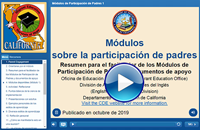
Resumen para el facilitador de los Módulos de Participación de Padres y documentos de apoyo
English version of Facilitator Overview of Migrant Modules and Handouts
Módulo 2: Utilizar disciplina positiva para ser un padre más eficaz
A través del módulo 2, los participantes recibirán información contextual, estrategias de implementación y ejemplos prácticos sobre cómo utilizar la disciplina positiva para ser un padre más eficaz. Podrán reflexionar sobre cómo este material se aplica a su vida diaria, practicar nuevas estrategias y realizar un plan para aplicar las nuevas estrategias.
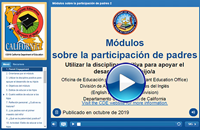
Utilizar disciplina positiva para ser un padre más eficaz
English version of Using Positive Discipline to Be a More Effective Parent
Módulo 3: Criar a niños seguros de sí mismos implementando objetivos y una actitud orientada al crecimiento
A través del módulo 3, los participantes recibirán información contextual, estrategias de implementación y ejemplos prácticos sobre cómo criar niños seguros de sí mismos implementando objetivos y una actitud orientada al crecimiento. Podrán reflexionar sobre cómo este material se aplica a su vida diaria, practicar nuevas estrategias y realizar un plan para aplicar las nuevas estrategias.
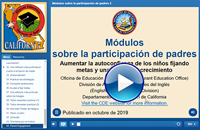
Criar a niños seguros de sí mismos implementando objetivos y una actitud orientada al crecimiento
English version of Growing Self-Confident Children Through Goal Setting and Growth Mindset
Módulo 4: Sistemas escolares y múltiples culturas
A través del módulo 4, los participantes recibirán información contextual sobre los sistemas escolares estadounidenses y las diferencias culturales con otros sistemas y recibirán estrategias prácticas para superar las diferencias, centrándose en ejemplos de las escuelas mexicanas y estadounidenses. Podrán reflexionar sobre cómo este material se aplica a su vida diaria, practicar nuevas estrategias y realizar un plan para aplicar las nuevas estrategias.
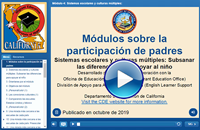
Sistemas escolares y múltiples culturas
English version of School Systems and Multiple Cultures
Módulo 5: Ayudar a que su hijo/a tenga éxito en la escuela
A través del módulo 5, los participantes recibirán información contextual, estrategias de implementación y ejemplos prácticos sobre cómo ayudar a que sus hijos tengan éxito en la escuela. Podrán reflexionar sobre cómo este material se aplica a su vida diaria, practicar nuevas estrategias y realizar un plan para aplicar las nuevas estrategias.
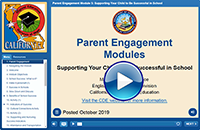
Ayudar a que su hijo/a tenga éxito en la escuela
English version of Supporting Your Child to Be Successful in School
Módulo 6: Entender y comunicarse con sus hijos adolescentes
A través del módulo 6, los participantes recibirán información contextual, estrategias de implementación y ejemplos prácticos sobre cómo comunicarse de manera efectiva con sus hijos adolescentes. Podrán reflexionar sobre cómo este material se aplica a su vida diaria, practicar nuevas estrategias y realizar un plan para aplicar las nuevas estrategias.
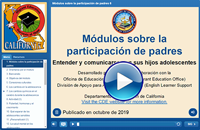
Entender y comunicarse con sus hijos adolescentes
English version of Understanding and Communicating with Your Teenager
Módulo 7: El acoso escolar: Qué es y cómo ayudar a sus hijos
A través del módulo 7, los participantes recibirán información contextual, estrategias de implementación y ejemplos prácticos sobre cómo ayudar a prevenir y apoyar a los niños en relación al acoso escolar.
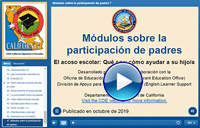
El acoso escolar: Qué es y cómo ayudar a sus hijos
English version of Bullying: What It is and How to Help Your Child
Module 1, Facilitator Overview of Migrant Modules and Handouts
Module 2, Using Positive Discipline to Be a More Effective Parent
Module 3, Growing Self-Confident Children Through Goal Setting and Growth Mindset
Module 4, School Systems and Multiple Cultures
Module 5, Supporting Your Child to Be Successful in School
Module 6, Understanding and Communicating with Your Teenager
Module 7, Bullying: What It is and How to Help Your Child
Parent Engagement Modules Series - Migrant (CA Dept of Education)
DeVos Stands Up For Testocracy
DeVos Stands Up For Testocracy
DeVos Stands Up For Testocracy
Thursday, Betsy DeVos issued a letter clarifying the Department of Education's position on postponing the Big Standardized Test this year, and it closes one of the few remaining gaps between DeVos and Arne Duncan.
In a letter to chief state school officers, DeVos noted that there has been a pandemic. She thanked the school leaders for their efforts to meet the needs of all students (forgetting, perhaps, all the times she has recently claimed that most pubic schools haven't done a damn thing) and notes that some of the crew has been bringing up the issue of testing waivers for this school year.
The answer, she says, is a big fat "Nope." She expects that the BS Tests will be given. And she offers this:
As you’ll recall, statewide assessments are at the very core of the bipartisan agreement that forged ESSA. They are among the most reliable tools available to help us understand how children are performing in school. The data from assessments can help inform personalized
support to children based on their individual needs and provide transparency about their progress. There is broad and consistent support for assessments because there is general agreement among CONTINUE READING: DeVos Stands Up For Testocracy
Video: Start off school by watching, “Teaching When The World Is On Fire”
Video: Start off school by watching, “Teaching When The World Is On Fire”
Video: Start off school by watching, “Teaching When The World Is On Fire”
Dr. Lisa Delpit, Sarah Ishmael, Jonathan Tunstall, & Jesse Hagopian on the struggle for racial justice in education.

Our world is literally on fire–whether it’s the climate change fueled fires in California or the police terror fulled fires from the uprising for Black lives–and educators have a special responsibility in this era to help students make sense of the these realities and empower them to help make collective change.
With school starting back, now is a good time to check out this video, hosted by Dr. Lisa Delpit, on “Teaching When The World Is On Fire.”
As part of the 2020 “Reimagining Education: Teaching, Learning, and Leading for a Racially Just Society Summer Institute,” I joined the amazing Dr. Lisa Delpit for a discussion on themes from her newest book, Teaching While the World is on Fire–a book I contributed to with a co-authored chapter with Dr. Wayne Au titled, “How One Elementary School Sparked a Citywide Movement to Make Black Students’ Lives Matter.” Also joining the panel were book CONTINUE READING: Video: Start off school by watching, “Teaching When The World Is On Fire”
The School Reopening Gamble
The School Reopening Gamble
In the next week or so, schools districts all over the country will reopen their buildings as their new year begins. During our pre-service training, a teacher colleague of mine described the process as a “grand experiment.”
But he’s wrong; it’s not an experiment. It’s a gamble.
An experiment, by definition, is a controlled, scientific procedure designed to gain knowledge. When a researcher conducts an experiment, they try, as much as possible, to control for outside factors that may affect an outcome. The goal is to see relationships between causes and effects, and better understand how the world works.
A gamble, on the other hand, is a risky action taken with the hopes of getting a favorable result. A gambler isn’t trying to learn anything – all they want is a win.
America’s school reopening plans aren’t experiments; we aren’t trying to learn more about how COVID-19 spreads, or its effects. We are, instead, making a huge bet: we’re hoping that we’ll get the benefits of sending children into school buildings without making the pandemic worse.
The problem, however, is that a good gambler always knows the odds. Before placing a bet, a gambler weighs the risks of losing against the rewards of winning. Las Vegas is full of CONTINUE READING: The School Reopening Gamble
Talk out of School podcast with Jamaal Bowman and Randi Levine
Talk out of School podcast with Jamaal Bowman and Randi Levine
Talk out of School podcast with Jamaal Bowman and Randi Levine
Check out our latest "Talk out of School" podcast with former principal Jamaal Bowman about his landslide primary win in NY's District16 and what he intends to do for our public schools when he gets to Congress.
Then we spoke to Randi Levine, Policy Director of Advocates for Children, about what she thinks of the city's just-released school reopening plan and whether it does enough for the more than 200,000 students with special needs and the 114,000 students who are homeless. More information below.
More resources:
Jamaal Bowman’s education platform and his ideas for opening schools in a time of COVID-19.
Advocates for Children website
AFC NY Helpline: Call (866) 427-6033 on Monday to Thursday, 10 am to 4 pm
AFC Op Ed on how homeless students deserve special attention in NYC’s school reopening plan
Talk out of School podcast with Jamaal Bowman and Randi Levine
Charter Schools Find Gold in Federal Government Aid to Small Businesses While Black-Owned Firms Get the Shaft - Citizen Truth
During the COVID-19 pandemic and the ensuing economic fallout, the charter industry added to systemic inequities that afflict Black communities.
A VERY BUSY DAY Larry Ferlazzo's Websites of the Day... The latest news and resources in education since 2007
Larry Ferlazzo's Websites of the Day... | The latest news and resources in education since 2007

Larry Ferlazzo's Websites of the Day... | The latest news and resources in education since 2007
















